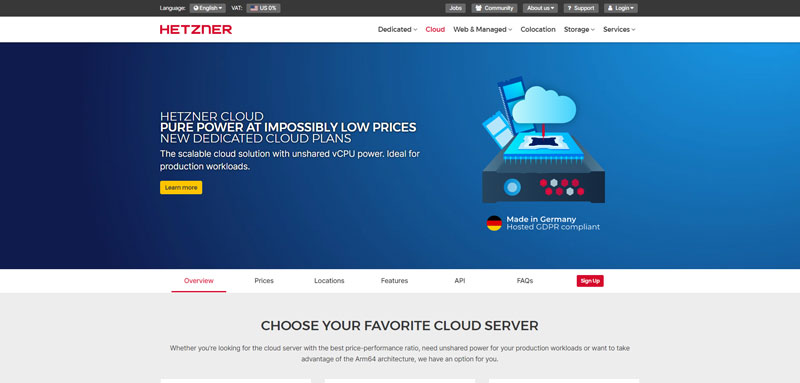Best Linux VPS Providers Top 10 of 2025 [Comparison]
Nowadays, people struggle to find the Best Linux VPS provider with affordable prices, an on-time and technical support team, no hidden fees, global locations, various payment methods, and hassle-free.
Based on the customer reviews, I found that today, people are looking for decent and round-the-clock support from the Linux provider the most. So, we suggest making your final choice based on the Linux VPS provider’s support quality, prices, and reliability when choosing your hosting provider.
Unlike many other articles that cover the low-tier Linux virtual private server providers for their own benefit, we have mentioned the market’s leading names so you can compare and pick the best Linux VPS provider.
Disclaimer: This article is written based on the provider’s websites, discussions on well-known web forums, and the old and the newest reviews of verified users on various rating platforms.
We have read the customers’ reviews and checked the providers’ websites to validate the claims and help you choose the best Linux VPS provider in 2025.
Best Linux VPS providers in 2025 ranked
1. OperaVPS
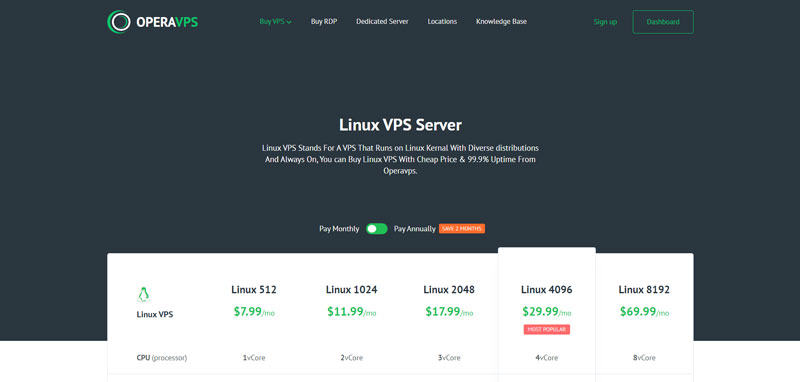
At OperaVPS, we prioritize personalized support over automated responses. Our devoted team ensures every ticket receives prompt attention, with real people ready to assist you via phone and free Skype calls.
With dedicated resources, root access, and immediate delivery within 10-12 minutes, you have full control to customize your Linux VPS to your exact needs.
99.9 percent of the customers at OperaVPS enjoy lightning-fast internet speeds across our global server locations, spanning the Netherlands, France, Germany, USA, Poland, UK, Canada, Romania, Bulgaria, Austria, Singapore, Australia, UAE, India, and Turkey. Wherever your audience is, we’re there to ensure optimal performance and accessibility.
All OperaVPS plans are covered by DDOS protection to guarantee the safety of your valuable data.
Enjoy hassle-free 3-day refunds and pick any of quarterly, semi-annual, annual, biannual, and 36-month billing cycles to suit your needs.
You can choose from a diverse array of pre-installed Linux distributions, including Ubuntu, CentOS, Debian, FreeBSD, ArchLinux, and AlmaLinux, each optimized for performance and reliability. And with complimentary backups and snapshots available upon request, your data’s security is our top priority.
We offer flexible payment options, including Perfect Money, credit cards, PayPal, and cryptocurrencies like Bitcoin, Ethereum, Tether, and more.
And forget about time-consuming KYC processes for crypto payments—we value your trust and time above all else.
Features:
- Affordable, cost-effective price for valuable features
- Renewal rates are the same as the initial prices
- Various support channels, including Free Skype calls, phone calls, and tickets
- Multiple pre-installed Linux distros to choose from: Ubuntu, CentOS, Debian, FreeBSD, ArchLinux, and AlmaLinux
- LEMP, LAMP, Plesk, cPanel, OpenVPN, Docker, CentOS Web Panel, and Gitlab one-click installation
- Over 20 global locations
- No hidden or setup fees
- SLA 99.99% uptime guarantee
- Root access
- DDOS protection
- Diverse scalable Linux VPS plans
- Unlimited bandwidth
- Various payment methods covering a wide range of cryptocurrencies
- Disks are encrypted for free
- Plans starting at 1vCPU/512MB RAM
- No KYC for crypto payments
- Free website migration
- Free backups and snapshots upon request
| Plan | Linux 512 | Linux 1024 | Linux 2048 | Linux 4096 | Linux 8192 |
|---|---|---|---|---|---|
| Price | $7.99 | $11.99 | $17.99 | $29.99 | $69.99 |
| Order Now | Order Now | Order Now | Order Now | Order Now |
2. Hetzner
Hetzner is one of the leading and best cloud VPS providers of all time and delivers very affordable prices. This Linux VPS provider offers abundant plans starting from 1vCPU/2GB RAM.
Hetzner’s VPS plans include DDOS and data protection, load balancer, enhanced performance, and free firewalls. Hetzner does not offer free backups and there is no information about Linux VPS money-back terms.
Customers and rightful activities are of utmost importance for Hetzner. With this in mind, Hetzner company has implemented a very rigid KYC process for its customers. This fact prohibits many people from purchasing Hetzner’s products.
Another downside for Hetzner is its limited locations, with only three locations available.
Pros:
- Pay-as-you-go
- Simple and easy-to-use servers and UI/UX
- Ultra cheap, competitive, and affordable prices
- Dedicated server auction
- Positive reviews from customers across the web
Cons:
- Implements a strict KYC verification system and does not verify every customer
- Lack of support for unmanaged plans
- No crypto payment
- No free backups or snapshots
- Plans start from 1vCPU/2GB RAM
| OperaVPS | Hetzner | |
|---|---|---|
| Affordable Prices | ✅ | ✅ |
| Personal On-Time Support | ✅ | ✅ |
| Dedicated Resources | ✅ | ✅ |
| Crypto Payment | ✅ | ❌ |
| Free Backups | ✅ | ❌ |
3. DigitalOcean
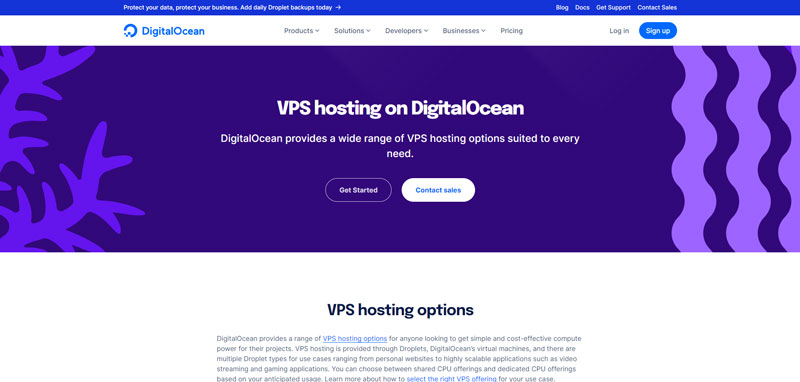
DigitalOcean emerged in 2012 to address the requirements of developers seeking straightforward and cost-effective cloud computing options. They have adapted their services over the past decade to accommodate software developers and the pivotal small-to-medium-sized enterprises driving innovation today.
DigitalOcean adopts a pricing structure revolving around “Droplets,” which are customizable virtual machines allowing adjustments in CPU, memory, storage, and bandwidth allocations. All droplets have a 99.99% uptime SLA, paid load balancer, paid backups, and on-demand snapshots. DigitalOcean offers six Linux distros for the Linux VPS OS.
Unfortunately, DO does not accept crypto payments.
Pros:
- Flexibility and scalability
- General purpose, Memory-optimized, Storage-optimized, and Premium CPU-optimized plans
- 99.99% uptime SLA
- The basic plan starts with 512MB RAM/1vCPU
- Cheap and affordable prices
- Global locations
Cons:
- In spite of its global presence, DigitalOcean’s data centers are primarily located in limited geographic regions like the US and EU
- Limited Support Options
- Complicated email server setup
- No free backups
- No crypto payment
| OperaVPS | DigitalOcean | |
|---|---|---|
| Affordable Prices | ✅ | ✅ |
| Personal On-Time Support | ✅ | ❌ |
| Dedicated Resources | ✅ | ✅ |
| Crypto Payment | ✅ | ❌ |
| Free Backups | ✅ | ❌ |
4. Hostinger
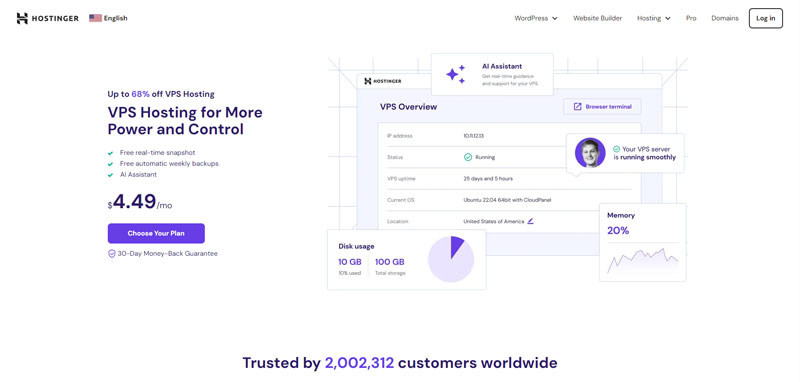
Hostinger is recognized for its affordable pricing, appealing to individuals and small businesses seeking to reduce hosting expenses without sacrificing quality. Hostinger comes with some features like SSD Storage, support for up to 100 websites, weekly backups, unlimited bandwidth, a browser terminal, and a free SSL on every plan.
While Hostinger is praised for its cost-effectiveness and user-friendly interface, it’s crucial to acknowledge its limitations and potential drawbacks. Some users have reported experiencing performance issues, particularly with shared hosting plans, leading to slower website loading during peak usage periods.
Prices at Hostinger start from 11.89$ per month for the basic plan, including a hidden 1.90$ tax fee. Note that the prices you see on Hostinger’s “Linux VPS Hosting” page are for the 24-month period.
Pros:
- Global data centers
- Weekly backups
- AI assistant
- Various payment methods
- Root access
- Dedicated IP Address
Cons:
- No telephone support
- The control panel(hPanel) can be slow
- Plans starting from 4GB RAM/1vCPU
- Slow response times (tested)
- Hidden fees
- Renewal rates are higher
- 99.90% Uptime
- Limited number of plans
| OperaVPS | Hostinger | |
|---|---|---|
| Affordable Prices | ✅ | ✅ |
| Personal On-Time Support | ✅ | ❌ |
| Dedicated Resources | ✅ | ❌ |
| Crypto Payment | ✅ | ✅ |
| Free Backups | ✅ | ✅ |
5. OVHcloud
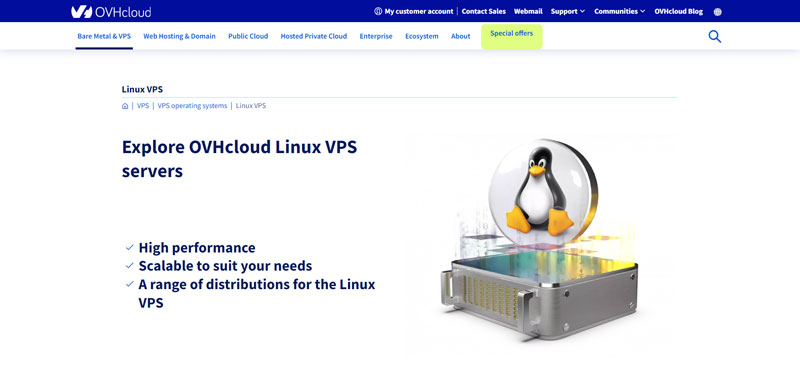
OVHcloud remains Europe’s leading provider and ranks third globally regarding physical servers. It boasts the world’s most extensive data center network in terms of coverage.
OVH provides bandwidth up to 2Gbps, DDoS protection, customizable plans, and increased performance. The main downside of the OVH is its paid support plans, which result in low quality of its free (Standard) support.
OVHcloud’s Linux VPS services are praised for their robust infrastructure and competitive pricing. But before deciding on OVHcloud for your VPS hosting needs, it’s wise to consider the potential downsides. These could include issues with technical support, network reliability, security, and user experience.
Pros:
- Easy to set up
- Worldwide network of 32 data centers on four continents
- Low page loading speed
- Six Linux distros
- Scheduled phone support
- Root access
Cons:
- Slow standard support (quality support is available through three paid plans starting from 56$/month)
- Confusing UX and dashboard
- Plans start from 2vCPU/2GB RAM
- Tax fee is not included in prices
- No money-back guarantee and no free trials
- No free website migration
- Doesn’t offer automatic backups for free
- Not beginner-friendly
- No crypto payment
| OperaVPS | OVHcloud | |
|---|---|---|
| Affordable Prices | ✅ | ✅ |
| Personal On-Time Support | ✅ | ❌ |
| Dedicated Resources | ✅ | ✅ |
| Crypto Payment | ✅ | ❌ |
| Free Backups | ✅ | ❌ |
6. LiquidWeb
Liquid Web is a hosting company that provides specifically for web and cloud professionals, including growing businesses, designers, developers, and agencies.
All VPS plans come with 10 TB bandwidth, 50 GB free off-server backups, DDoS protection, root access, and an integrated firewall. They even have a 100% uptime guarantee that will reward any downtime up to 10x credit; for example, if you experience one hour of downtime, you will be granted 10 hours of credit. Of course, this guarantee has its terms.
As one of the big names on the market for 25 years, Liquid Web’s VPS prices are in a different league. The price tags are for two-year contracts that should be paid upfront. The basic plan starts from 59$ a month.
They offer various versions of only two Linux distros and do not provide a free SSL certificate. Liquid Web has just three locations and limited payment methods.
The quality of Liquid Web’s support team, unlike OperaVPS support technicians, has declined in recent years based on verified customer reviews.
Pros:
- General, Memory-optimized, and CPU-optimized plans
- 10T bandwidth on all plans
- 100% uptime guarantee
- Off-server backups up to 50GB
- DDoS protection
- 30-day money-back guaranty
- Free Cloudflare CDN
Cons:
- Very expensive plans
- Plans start from 2vCPU/2GB RAM
- Higher renewals
- Limited linux OSs (two Linux distros)
- Much fewer locations compared to other leading providers
- Lack of unmanaged plans
- Does not provide free SSL
- Decline in support performance in recent years
| OperaVPS | Liquid Web | |
|---|---|---|
| Affordable Prices | ✅ | ❌ |
| Personal On-Time Support | ✅ | ❌ |
| Dedicated Resources | ✅ | ✅ |
| Crypto Payment | ✅ | ❌ |
| Free Backups | ✅ | ✅ |
7. Linode

Linode is a well-regarded cloud hosting service recognized for its dependable performance and developer-centric features. Linode empowers developers, businesses, and enthusiasts to efficiently deploy and manage their applications.
Nonetheless, similar to any service, it does come with its drawbacks. First of all, Linode (Akamai) is not novice-friendly but an ideal choice for seasoned developers. Backups are not on the house, so you have to pay an extra fee to conclude it in your plan.
Linode enforces KYC verification, so to purchase a product or view the final price, you must open and verify your account. This could be the spot where some users cease to buy and use the company’s services.
Pros:
- One-click app marketplace
- Uptime (SLA) guarantee of 99.99%
- Pay-as-you-go option
- Phone support
Cons:
- Customers report that despite adding more regions in Europe, billing remains in USD only
- Not beginner-friendly
- Implements KYC
- No live chat
- Paid backups (covering two last weeks)
- Slow customer support team
| OperaVPS | Linode | |
|---|---|---|
| Affordable Prices | ✅ | ✅ |
| Personal On-Time Support | ✅ | ✅ |
| Dedicated Resources | ✅ | ❌ |
| Crypto Payment | ✅ | ❌ |
| Free Backups | ✅ | ❌ |
8. BlueHost
Since its establishment in 2003, Bluehost has been dedicated to providing cutting-edge web hosting solutions, consistently finding fresh approaches to fulfill its goal: enabling individuals to maximize their online presence.
Comprehensive tools catering to all needs, endorsed by WordPress.org, Bluehost provides three Linux VPS hosting plans with unmetered bandwidth. On the other hand, the cPanel’s fee is included in the price tags, and the shown prices are for the 36-month contract. The renewal prices are reverted to the original price.
Bluehost does NOT offer free SSL certificates, global locations, any SLA guarantee for uptime, and free website migration.
Pros:
- Unmetered bandwidth
- Optional two-factor authentication
- Novice friendly
- 30-day money-back policy
- Root access
Cons:
- The basic plan comes with 2GB RAM/2vCPU core
- cPanel license fee is included in the price beforehand
- Offers only three plans
- High prices for Linux VPS plans
- Higher renewal rates
- No free website migration
- No SLA (Service Level Agreement) for server uptime
- They only have data centers in the US
- Page load speed is a bit slow
- Uptime 99.95%
- No free SSL
| OperaVPS | Bluehost: | |
|---|---|---|
| Affordable Prices | ✅ | ❌ |
| Personal On-Time Support | ✅ | ❌ |
| Dedicated Resources | ✅ | ✅ |
| Crypto Payment | ✅ | ❌ |
| Free Backups | ✅ | ❌ |
9. DreamHost

DreamHost, a provider of Linux VPS hosting, has garnered mixed reviews from users and experts alike. Users have reported occasional performance issues, such as slow loading times and downtime, possibly due to oversubscribed servers or inadequate resource allocation. Additionally, DreamHost’s customer support has been criticized for being slow and lacking technical expertise at times.
DreamHost prioritizes simplicity and user-friendliness, appealing to newcomers or individuals seeking a hassle-free hosting solution. Nevertheless, this focus on simplicity could mean sacrificing access to the advanced features and customization choices experienced users often seek.
Despite DreamHost claiming to offer reliable uptime, some users have experienced unexpected downtime. While DreamHost may be suitable for individuals or small businesses with modest hosting needs and budget constraints, it’s essential to weigh these downsides against its benefits before making a decision.
Pros:
- One-click installer
- Decent storage
- 97-day money-back guarantee
- No upselling or mandatory add-on purchasing
- Free SSL certificate
Cons:
- Higher monthly prices compared to the competition
- No crypto payment or bank transfers
- Fake discount rates
- Higher renewal prices
- No unmanaged services
- Slow page load speed
- Only US-location
- It doesn’t offer live chat support 24 hours daily, only from 3:00 AM to 9:30 PM Pacific Time
- No phone support
- Slow ticket support
| OperaVPS | DreamHost | |
|---|---|---|
| Affordable Prices | ✅ | ❌ |
| Personal On-Time Support | ✅ | ❌ |
| Dedicated Resources | ✅ | ❌ |
| Crypto Payment | ✅ | ❌ |
| Free Backups | ✅ | ✅ |
10. HostGator

One of the best Linux VPS providers for years until ten years ago, HostGator offers a user-friendly experience catering to both novices and experts. Its Linux VPS services grant you root access, powerful hardware, weekly backups (if under 20GB), and advanced functionality.
But all these features come at very high price tags compared to the market and competitors. The prices you see on HostGator’s website are for the annual contract. The monthly price of the basic plan is 41.99$. Additionally, you have just one Linux distribution for your VPS hosting.
The problem with HostGator is that its loyal customers say they have migrated from this provider in the last ten years, as since that time, they have experienced significant drops in the quality of services and customer support.
Pros:
- Free automatic weekly backups
- Limited free migration for VPS hosting plans within 30 days of signup
- Root access
- 30-day money-back guaranty
- Phone support and online chat
Cons:
- Very high prices for provided features
- Even higher renewal fees
- Just three plans to choose
- Only one Linux distro
- No crypto payment
- No free SSL certificate
- Slow customer support
- Automatic weekly backup for accounts under 20GB
- Data centers are limited to the US
- Spam and malware protection are paid options
- Paid website migration (150$ per website) for plans exceeding 30 days of activation
- 99.90% uptime
| OperaVPS | HostGator | |
|---|---|---|
| Affordable Prices | ✅ | ❌ |
| Personal On-Time Support | ✅ | ❌ |
| Dedicated Resources | ✅ | ❌ |
| Crypto Payment | ✅ | ❌ |
| Free Backups | ✅ | ✅ |
Best Linux VPS distros for VPS hosting
When choosing a Linux VPS from a leading provider, you have multiple choices for your OS. There are various Linux distros, each tailored for specific needs.
When it comes to selecting the Linux VPS distro, it’s crucial to consider your specific needs. Here, we present the best Linux distros for Linux VPS, each offering a unique set of features and benefits:
-
Ubuntu
Ubuntu is Debian-based and the most favorite distro among Linux users, with a GUI (Graphical User Interface).
In general, Ubuntu is a favored choice due to its user-friendly interface, dependable performance, and most importantly, its adaptability.
This adaptability empowers you to customize your Linux VPS to suit your specific needs, making it a dependable and effective operating system for various computing requirements.
-
Debian
Debian stands out as a reputable Linux distribution valued for its unwavering stability, robust security measures, and dedication to free software ideals.
Its extensive array of software packages cater to varying requirements for both stability and innovation. Supported by an active community and long-term assistance options, Debian proves itself to be a dependable option suitable for both desktop and server setups.
-
CentOS
CentOS is a favored Linux distribution for its solidity, trustworthiness, and long-term support. Based on the freely available source code of Red Hat Enterprise Linux (RHEL), CentOS provides a robust platform for server deployments and enterprise use. Additionally, CentOS benefits from a large community of users and developers who contribute to its ongoing development and provide support through forums and documentation.
-
Fedora
Fedora, backed by Red Hat, is a forward-thinking Linux distribution esteemed for its dedication to innovation, open-source values, and collaborative development.
Striking a balance between stability and fresh features, it enjoys popularity across desktop and server landscapes alike. With releases roughly every six months, Fedora ensures users stay current with the latest software advancements and technologies.
-
Rocky Linux
Rocky Linux is a community-driven, enterprise-grade Linux distribution created as an alternative to CentOS. It aims to provide a stable, secure, and fully compatible platform for mission-critical workloads and enterprise deployments. Built from the same upstream sources as Red Hat Enterprise Linux (RHEL), Rocky Linux ensures compatibility with RHEL-based applications and environments. It follows a predictable release cycle and offers long-term support options, making it suitable for production use.
-
AlmaLinux
AlmaLinux emerged as a free and open-source Linux distribution developed to fill the void left by CentOS. Its primary goal is to furnish users and organizations with a stable and dependable platform, ideal for sustaining long-term infrastructural needs.
Crafted from the same upstream sources as Red Hat Enterprise Linux (RHEL), AlmaLinux ensures seamless compatibility with RHEL-based applications and settings.
Following a consistent release schedule and offering extended support options, it proves its worthiness for deployment in mission-critical business environments.
-
OpenSUSE
OpenSUSE stands out as a Linux distribution renowned for its user-friendliness, adaptability, and an array of tools tailored for developers, system administrators, and everyday users.
It presents two main editions: Leap, characterized by its stable and cautious release cycle rooted in SUSE Linux Enterprise, and Tumbleweed, which adopts a rolling-release approach, delivering the latest updates and innovative features continuously.
Why choose OperaVPS as your Linux VPS provider?
If you’re weighing your options for the best Linux VPS provider, here’s why OperaVPS could be your best bet:
- Competitive Pricing
OperaVPS offers Linux VPS plans at budget-friendly prices without compromising on features. With transparent pricing, no higher renewal rates, and no hidden fees, you can confidently start with a low-cost plan and extend your contract worry-free. - 24/7 Support
We understand the importance of reliable support when issues arise. That’s why our experienced technicians are available round-the-clock to assist you with any VPS-related challenges. Reach out to us via FREE Skype calls, phone support, or our ticketing system.
- Money-Back Guarantee
Your satisfaction is our priority. If you’re not completely happy with our service, we offer a hassle-free refund policy.
- Flexible Payment Options
Choose from a wide range of payment methods, including Perfect Money, credit cards, PayPal, and cryptocurrencies like Bitcoin, Ethereum, and Tether, to pay for your Linux VPS server.
- Variety of Linux Distributions
OperaVPS provides a selection of pre-installed Linux distros for your VPS needs, including Ubuntu, CentOS, Debian, FreeBSD, ArchLinux, and AlmaLinux.
- One-Click App Installation
Simplify your workflow with our one-click app installation feature. Install popular applications like Plesk, cPanel, OpenVPN, Docker, LEMP, LAMP, CentOS Web Panel, and Gitlab effortlessly.
- Global Reach
With 20 global locations, OperaVPS ensures fast access for your audience, no matter where they are.
Choosing OperaVPS for your Linux VPS needs means prioritizing affordability, reliability, and exceptional customer support. Your concerns are our concerns, and we’re committed to addressing them in the best possible way.
What features should the best Linux VPS provider have?
When choosing the best Linux VPS provider, you should determine the criteria and factors that distinguish a Linux VPS provider from others, then create a list based on those criteria and prioritize the providers based on your needs. To make an informed decision among a wide range of Linux VPS providers, consider the following key factors:
Fair pricing
The best Linux VPS provider will consider a fair price for its services with a reasonable ratio between the offered services and features and the pricing of the plans.
In addition, a reliable VPS provider will price their services transparently and avoid hidden fees because this is considered cheating. Unfortunately, some leading providers hide setup or tax fees, and most of them even charge the customer higher renewal rates, unlike OperaVPS.
Some VPS providers may seem to offer cheap VPS plans, but in practice, the claimed prices are for the long and over annual billing cycles additional fees are charged for each optional services, and when you pay the bill, you will realize that you have been cheated. Therefore, we recommend that when choosing a VPS provider, prioritize the performance and high quality of VPS and check the logical ratio between the quality of service and pricing, and according to the budget you have and the comparison you made, choose the right brand for Linux VPS.
24/7 customer support
Fast and 24/7 technical support is one of the distinguishing features of the best VPS provider because every customer expects to be able to contact the expert team of the VPS provider company at any time of the day and night when he encounters a problem.
24/7 availability of the dedicated support team of the OperaVPS through various communication channels like Skype, phone calls, and ticketing system guarantees accompanying and supporting the user in managing the VPS server.
So, when choosing the best VPS provider, look for and evaluate their technical support.
Variety of locations offered for Linux VPS
VPS location is one of the most effective factors in the performance, page loading speed, and download/upload speed, improving the site’s search engine optimization (SEO) and the pleasant user experience of Linux VPS.
The best VPS provider tries to respond to users’ needs and obtain their satisfaction by providing data centers worldwide. Choosing a location close to your audience and areas where you expect more traffic has a significant impact on your site’s performance.
The best Linux VPS hosting provider that supports various locations and data centers can fulfill your needs.
Providing Root access
Granting root access for VPS services is a commendable advantage, as it gives users sufficient permission for tasks such as managing the VPS, executing commands, executing scripts, security settings, creating and deleting user accounts, managing passwords, backups, information recovery, technical problem solving, software installation, automation controls, network settings, network traffic monitoring, and solving connection problems.
Furthermore, you will be independent of the host administrator in server management. Therefore, unlimited access to VPS has many advantages for users that should not be neglected. The best Linux VPS provider gives you enough privileges to control and manage your server thoroughly.
Excellent VPS performance
The leading Linux VPS providers prioritize user satisfaction and provide quality services to create the best user experience. But how do we know that the VPS provider’s services are of high quality?
Using modern and powerful hardware equipment and high-speed SSD drivers impacts fast data access and overall server performance. Server performance and reliable network connection are important in using a server, so never sacrifice quality and optimal performance for a low price.
When you don’t get the performance you expect from your server, the cost you have spent to purchase the service is considered a loss.
For example, you need at least 512 MB of storage space to run the Linux operating system and control panels, which we offer as our basic and cheap Linux VPS plan at OperaVPS.
Scalability and flexibility
To make the right decision in choosing the best VPS provider, research whether the VPS provider supports the scalability and upgradeability of VPS plans or not. Providing flexible plans and allowing resources to be upgraded as needed is one of the best Linux VPS providers’ features.
As your business grows, so do your needs, so the ideal VPS provider should offer scalability and extensive and flexible Linux VPS plans.
High uptime Linux VPS
Choose a VPS provider that guarantees the highest level of reliability and more than 99.96% server uptime. To trust a VPS provider to guarantee server uptime and long-term server availability, check for additional infrastructure, reliable network connectivity, and backup systems.
Money back guarantee
The money-back guarantee is a guarantee of the quality of the server and is a factor that gives credit to the VPS provider. The reliable provider company is sure of the quality of the server it provides. The money-back guarantee gains the user’s trust and removes the worry so they do not suffer financial loss if the purchased hosting service cannot fulfill their wishes.
Support for popular Linux operating systems
Getting a Linux VPS with the specific distribution you are considering is a valuable advantage because it saves your time and energy, so look for a VPS provider that supports various Linux distributions such as Ubuntu, Debian, CentOS, etc. As a result, you can easily benefit from a Linux VPS with the desired distribution already installed without the need to install and configure your preferred operating system.
Server security measures
Security is one of the most important and sensitive issues that cannot be ignored. The best VPS provider company should implement security measures such as an F-secure layer system, regular security updates, intrusion detection systems, and firewall protection to prevent security vulnerabilities, website hacking, and intrusion. As a result, in this way, they can create a safe environment to protect user data and programs and provide the highest level of security in VPS.
By considering the factors we have introduced, collect a list of your preferences and choose the best VPS provider based on your needs and preferences. To make an informed decision in choosing a VPS provider to buy Linux VPS , researching and reviewing users’ opinions and feedback about the quality of service and support of the VPS provider can be a useful method. Researching Linux VPS providers will give you insight into the user experience of your brand and guide you in choosing the best VPS provider.
As a result, to choose the best VPS provider, in addition to coordinating the factors we mentioned with your goals, prioritize hardware quality and server performance, affordable price, and reliability and enjoy choosing and buying VPS. In the following, we will list the best Linux VPS providers to guide you in selecting the best VPS provider.
Conclusion
All the information included in this article is based on real customers’ experiences with the top ten leading and best Linux VPS providers for more than 15 years.
You can rest assured that the pros and cons of each Linux virtual private server provider are tested so you can make your decision based on this article.
As a reminder, the best Linux VPS providers are:
1.OperaVPS
2.Hetzner
3.DigitalOcean
4.Hostinger
5.OVHcloud
6.LiquidWeb
7.Linode
8.BlueHost
9.DreamHost
10.HostGator
